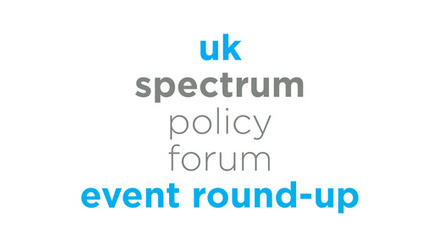UK SPF Event Round-up: Future Communications and 6G
The UK SPF co-sponsored an international workshop with the University of Strathclyde, in Glasgow. In the two-day event, experts from industry, academia, and government from around the world spoke on the challenges and opportunities around 6G.
Overall, panellists and presenters aimed to answer two key questions around the next generation for broadband.
- How to allow 6G?
- How to do it by enabling international collaboration?
The event featured a UK SPF Cluster 2 workshop on Future Policies Framework and Spectrum Requirements, led by the UK SPF Chairperson, Dr. Abhaya Sumanasena, and with the participation of speakers from member companies, along with the Cluster 2 Chair, Prof. Robert Stewart.
Future Policies Framework and Spectrum Requirements
The deployment and management of spectrum are crucial for the advancement of connectivity technologies. While modern technologies do enhance spectrum utilization, spectrum sharing is becoming increasingly important due to the scarcity of available spectrum bands.
In the UK, data consumption is concentrated in specific areas, prompting regulators to explore additional capacity layers in critical locations like ports and warehouses. Addressing the growing indoor traffic is another complexity that requires innovative solutions. Ofcom's Shared Access Licensing for local networks, which allows for increased interference and denser deployments, is a step in the right direction. These measures, assuming proper synchronization, could potentially increase spectrum availability significantly.
Within this context, the journey towards 6G is ongoing, with a focus on evolving technologies rather than rushing its deployment. The 3GPP, responsible for mobile standards, has begun studies for IMT-2030, paving the way for future advancements. Within these advances, spectrum utilization must be aligned with commercial demand, and regulators must consider the availability of spectrum to meet traffic demands.
Policy makers face the challenge of ensuring network deployments are scalable and cost-effective. This includes reducing license fees and improving the planning process to support service providers. Regulation should be designed to avoid unnecessary burdens while establishing a level playing field. This requires innovative approaches and cooperation from the research community to optimize spectrum usage and address competition and regulatory issues.
Understanding the changing needs for spectrum and exploring innovative sharing models is essential. The 6G challenge involves developing technologies that provide seamless connectivity indoors and outdoors. The use of AI and software-defined radio can facilitate faster licensing and more efficient spectrum management, potentially accelerating the adoption of advanced connectivity technologies.
Collaboration among various stakeholders, including researchers and industry players, is crucial for effective spectrum sharing. Given the scarcity of available bands, regulatory developments should focus in attending both outdoor and indoor data consumption.
The journey towards 6G involves ongoing studies and preparations, emphasizing the need for harmonized global standards and minimized hardware investments. Collaboration among stakeholders, companies, and researchers for the use of AI and software-defined radio are essential for optimizing spectrum usage, ensuring efficient network deployments, and driving the adoption of advanced connectivity technologies.
5G development toward the 6G roadmap
The development and deployment of 5G technology globally face significant challenges, despite its promising capabilities. Beyond spectrum concerns, ensuring that new 5G specifications and upcoming 6G technologies can coexist and interoperate with legacy equipment presents a considerable technical challenge.
Despite these challenges, 5G is demonstrating substantial growth, particularly in mobile broadband, with traffic increasing more rapidly than during the initial launch of 4G. This growth is driven by the technology's ability to deliver enhanced mobile broadband capacity.
However, in industrial applications, even though 5G has the potential to offer significant productivity gains across various sectors we are still to experience the benefits and increase in technology's penetration across industries.
The future of 6G promises higher frequencies and bandwidths, with AI playing a pivotal role in addressing the complexities of new use cases. The integration of chipmakers, hyperscalers, and satellite operators will be crucial for the ecosystem.
Each generation of mobile broadband technology brings new challenges. Geopolitical factors and the need for consistent standards further complicate the landscape. Nonetheless, advancements in AI and the integration of cloud computing are expected to revolutionize connectivity, making it more efficient and ubiquitous.
Operators and stakeholders must continue to address these challenges, focusing on energy efficiency, data management, and innovative business models to unlock the full potential of future generations of mobile broadband technology.
Contact us
To learn more about the UK SPF, please contact the team below.

Tales Gaspar
Tales has a background in law and economics, with previous experience in the regulation of new technologies and infrastructure.

Sophie Greaves
Sophie Greaves is Associate Director for Digital Infrastructure at techUK, overseeing the Communications Infrastructure and Services Programme at techUK, and the UK Spectrum Policy Forum.







